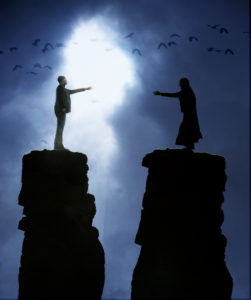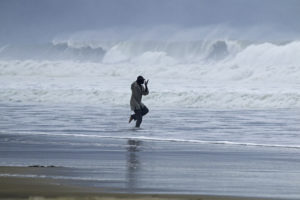One day each month, I lead a well-being discussion over lunch in Research Triangle Park, North Carolina. (Details can be found here) The talks are part philosophy, part psychology. There is a tentative spirituality that often creeps in, and is always welcomed. But at their core, the dialogues are human, rich in the poetics of a people having to navigate a life.
This week one of my friends (they are all friends) raised the need for a heart community among atheists and others that did not share a defined, otherworldly faith. He had been brought up in one of the Christian sects with its gatherings and public communion. And with everything good and sweet it had offered, it also drew boundaries. Boundaries that affirmed its members and held them together, but that also excluded and kept others bereft of their concern.
When my friend rejected their cosmology, he was left longing for a communal embrace.
Of course, he has many good, trusting friends. They are open and share an ethic and respect for persons. But they did not gather on weekends to celebrate or sing. They did not pass the basket to help a neighbor in need. They just went about their lives being good and kind, dropping the kids off at school and driving to the office each day. They just kept doing the things we all do on this necessary treadmill which rarely lets us step off to breathe.
Certainly, there are many practices and faiths that leave the sanctuary doors open. But often, those communities are only held together by a membrane, glistening and glimmering, but thin. Love for the universal humanity. It is beautiful, but common and impersonal. What he needed, what I and most of us need, is someone to love us, personally, with all of our weaknesses and faults.
Where does community come from? Can we ever do what Hierocles said? Take the concentric circles of our lives – self, family, kin, precinct, country and the whole of the human race – and pull each individual toward the center? To hold them all personally and dearly? I don’t know. I can only strive for an ideal. I can only work and adjust and work some more, to bring the world a little closer to what it could be, to what it really is, when it is its best.
In this, I find my community. The many circles in my life are not concentric. They are more like oases of shelter placed discretely through my day; at the office, at home, at the corner store and brewpub.
Sometimes its members come together, over nachos by a fire to discuss and make the real the beauty of an idea. But often they never meet. They might stand in coffee shops side-by-side waiting for a latte or espresso, without ever knowing they are each one of the caring.
But all of them, my community of friends, exhibit the best of humanity. Each one inspires me in some way, and makes me better than who I am.
There are those who teach me the sacred truths of the tulsi plant, or who live thoughtfully and deliberately and make things with their hands. Some join me at 6:00 a.m. in the cold to sit in silence with the sunrise, or call at 1:00 in the morning to discuss Levinas, King Kong or King Lear. We talk  about the joys and struggles of parenting and try to raise our children gently. There are friends that I never see who send me texts in the middle of the day to remind me of the good things. Because the good things are all around us. And there are those venerable souls who take in the forsaken, and take on the heartache, or who care for vulnerable, making themselves vulnerable too. And of course, there are those dear, dear friends who make me laugh and remind me to play. Those who say “yes” when I suggest biking deep in the woods after dark, or taking an all night bus to New Orleans to let the music wash over me.
about the joys and struggles of parenting and try to raise our children gently. There are friends that I never see who send me texts in the middle of the day to remind me of the good things. Because the good things are all around us. And there are those venerable souls who take in the forsaken, and take on the heartache, or who care for vulnerable, making themselves vulnerable too. And of course, there are those dear, dear friends who make me laugh and remind me to play. Those who say “yes” when I suggest biking deep in the woods after dark, or taking an all night bus to New Orleans to let the music wash over me.
There is so much more I can say. So many more people to thank, and to whom I bow. Community is everywhere, decentralized and open sourced. And while we may not all sit together in praise, they are all with me, always.
Let the people around you soften your heart. You will be enriched, encircled and embraced by a community of absolute and genuine care.
© 2017 John Albert Doyle, Jr., All Rights Reserved.
Images:
Come Together by Hartwig HKD/Flickr made available via a Creative Commons Attribution-NoDeriv 2.0 Generic license.
Mouvement et méditation is in the public domain.






Sean, I am absolutely fine with expressing that I am said individual seeking community! First off, it’s been a true pleasure to get to know you. It’s been great finally getting to meet one of the very wise writers I’ve run into reading the Psychology Today website, and to get to participate in your group, no less. I appreciate your facilitation of the group in a manner that’s so respectful of everyone at the table. You embody everything I wanted to be part of in moving to the Triangle.
I can support the idea that community is everywhere. I believe that working towards this understanding is, in fact, the only way to transcend our tribal roots and evolve as a species enough to survive our own potential self-destructive actions on ourselves and our planet.
I have three primary reasons for which is ironically the antithesis of what my hyper-individualistic, depressed 22-year old self thought about community (i.e. “it’s bullshit”):
1. I think we’re hard-wired for belonging to a tribe (as you allude in your writing about care) and that most secular institutions cannot replicate the familial, caring aspect that churches bring to their communities.
2. We have mechanisms and groups for helping people make the kind of life-affirming friendships they need to be fully healthy, but they aren’t working well enough.
3. We can’t seem to escape the need for ritual, and cohesive groups are our best shot at creating secular ones that reinforce and remind us of deep truths like those provided by positive psychology.
I have lots more to say, but for fear of a lengthy response, have kept the supporting arguments/thoughts for the above 3 points in my journal.
Guys, Sean is the real deal. His ideas and wisdom deserve the increasing audience they are receiving!
Corey, thanks so much for your kind words. You may have been the one who actually raised the issue, but you weren’t the only one looking for community. The description I gave more-or-less fits many of us. I’m so glad that you have been coming out to our various discussion groups. I have found the talks to be very authentic and human. (And did you notice, I referenced your nachos in the article too!)
Great comment, Corey! Sounds like we have very similar views (and maybe also personal histories) regarding community.
Look forward to discussing this further with you. I’ve been reading and thinking about this general subject for quite a while. In case it’s useful/interesting, here’s an off-the-top-of-my-head list of some good sources I’ve found:
– Hugh Hollowell is a great guy (and friend) who has created a community for vulnerable people in Raleigh. He preaches that “the opposite of homelessness is community” and he thinks and writes a lot on the subject. http://hughhollowell.org/
– Bart Campolo is one of Hugh’s mentors. Bart, the son of a famous evangelical pastor, is interested in how to build secular humanist communities and why it’s so important and why it’s so hard to do. He has a podcast on the subject and there was also a recent story about him in NYT. http://bartcampolo.org/
– Alain de Botton has written about “religion for atheists.” (I’m sympathetic to many of Alain’s views but I confess I’m not a big fan.)
– Mark Vernon is a former Anglican minister turned agnostic who now practices psychotherapy and teaches philosophy at Alain’s School of Life and writes a bunch of books and does a bunch of radio things. He’s one of my favorite thinkers. He’s written/talked a bit about secular communities, including this 30-minute radio piece on the Sunday Assembly: http://www.bbc.co.uk/programmes/b07m7z0r
– Robert Wright writes/speaks insightfully about tribal psychology from an evolutionary POV. I listen to his Wright Show podcasts regularly. I can’t at the moment think of a Wright Show episode explicitly about tribal psychology, but it seems to come up in pretty much every episode.
Beautifully said: “Love for the universal humanity.” This speaks to me of the longing to feel united, to belong while “holding them dearly.”
Hz. Rumi reminds us,
“You are not a drop in the ocean. You are the entire ocean in a drop.”
Thank you.
Thank you Can. You have really contributed a lot, not just to our discussions, but also to helping create these communities of caring and connection.
I really appreciate all you do to organize and facilitate these wonderful meet-ups. I always make it a priority to attend.
Curious to know who called you at 1:00 in the morning to discuss Levinas. 🙂
Ha! Thanks Justin. You bring so much to the discussions. I do appreciate when you come out. I do have a friend that I’ll talk with late at night about different novelists and philosophers, although I haven’t talked about Levinas with him (I took a little literary license there)
Simply put, dear friend, thank you for this article.
Thank you Aren. You are, without a doubt, part of that community of caring.